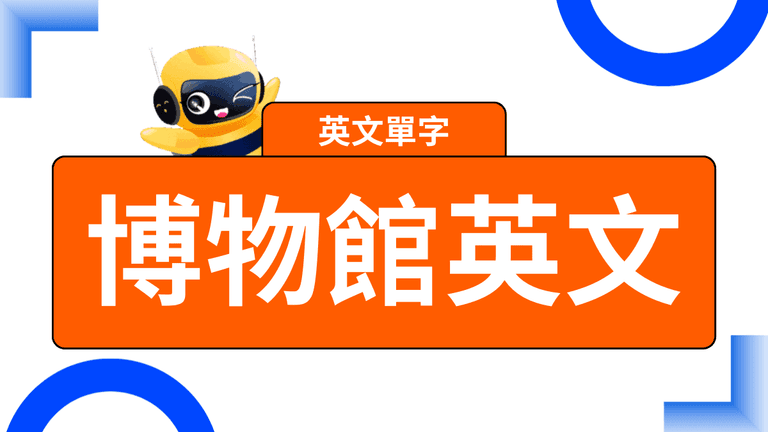英文條件句文法指南:詳解零到混合 5 大類型,Unless 與倒裝句型,附線上練習與解答
什麼是英文條件句?如何正確使用if條件句表達假設情境?英文條件句(Conditional Sentences)是用來表達「如果...就...」的假設關係句型,由條件子句(If-clause)和主要子句(Main Clause)組成。根據時間框架和真實性程度,英文條件句可分為五大類型:零條件句描述科學真理,第一條件句預測未來可能,第二條件句表達與現在相反的假設,第三條件句表達對過去的懊悔,以及混合條件句連結不同時間的假設。
許多台灣學習者在使用英文條件句時常犯的錯誤,包括在 if 子句中誤用 will,時態混淆,unless 後接否定動詞等問題。這些錯誤不僅影響考試成績,更會造成實際溝通時的誤解。掌握英文條件句不僅是通過 TOEIC,IELTS 等英語檢定的關鍵,更是職場電子郵件,學術寫作和日常對話中精準表達假設與可能性的必備技能。
本文由 PREPEDU 專業教學團隊整理,將系統性解析五大類型英文條件句的文法公式,使用時機與常見錯誤,並深入講解 unless,wish 等特殊條件結構,以及進階的倒裝句型用法。文章更提供30題分類練習題與詳細解答,幫助你透過實戰演練徹底掌握條件句的所有應用情境。

I. 什麼是條件句英文?解構英文條件句的核心——「條件」與「結果」
Conditional sentences 是什么?條件句(Conditional Sentences)是英文文法中用來表達假設情境的重要句型結構。條件句在中文裡常用「如果...就...」,「假如...那麼...」等句型來表達。
每個條件子句英文都由兩個關鍵部分組成:條件子句(If-clause)和主要子句(Main Clause)。英文條件句基本結構:
If 子句(條件) + 主要子句(結果)= 完整的條件句
-
If 子句是提出條件或假設的從屬子句,通常以連接詞"if"開頭。
-
主要子句則是獨立子句,描述在條件成立時會發生的結果或情況。
-
If 子句可以放在句首或句中,而主要子句始終表達句子的核心訊息。
英文條件句的語序會影響標點符號的使用,這是許多學習者容易忽略的細節:
|
語序 |
結構 |
範例 |
|
If 子句在句首 |
If + 條件,主要子句 |
If it rains tomorrow, we will cancel the picnic.(如果明天下雨,我們會取消野餐。) |
|
If 子句在句中 |
主要子句 + if + 條件 |
We will cancel the picnic if it rains tomorrow.(我們會取消野餐,如果明天下雨。) |
關鍵提醒:
-
If 子句在句首時,必須在條件子句後加逗號
-
If 子句在句中時,前面不需要逗號
-
兩種語序的意思相同,但句首的 If 子句通常更強調條件
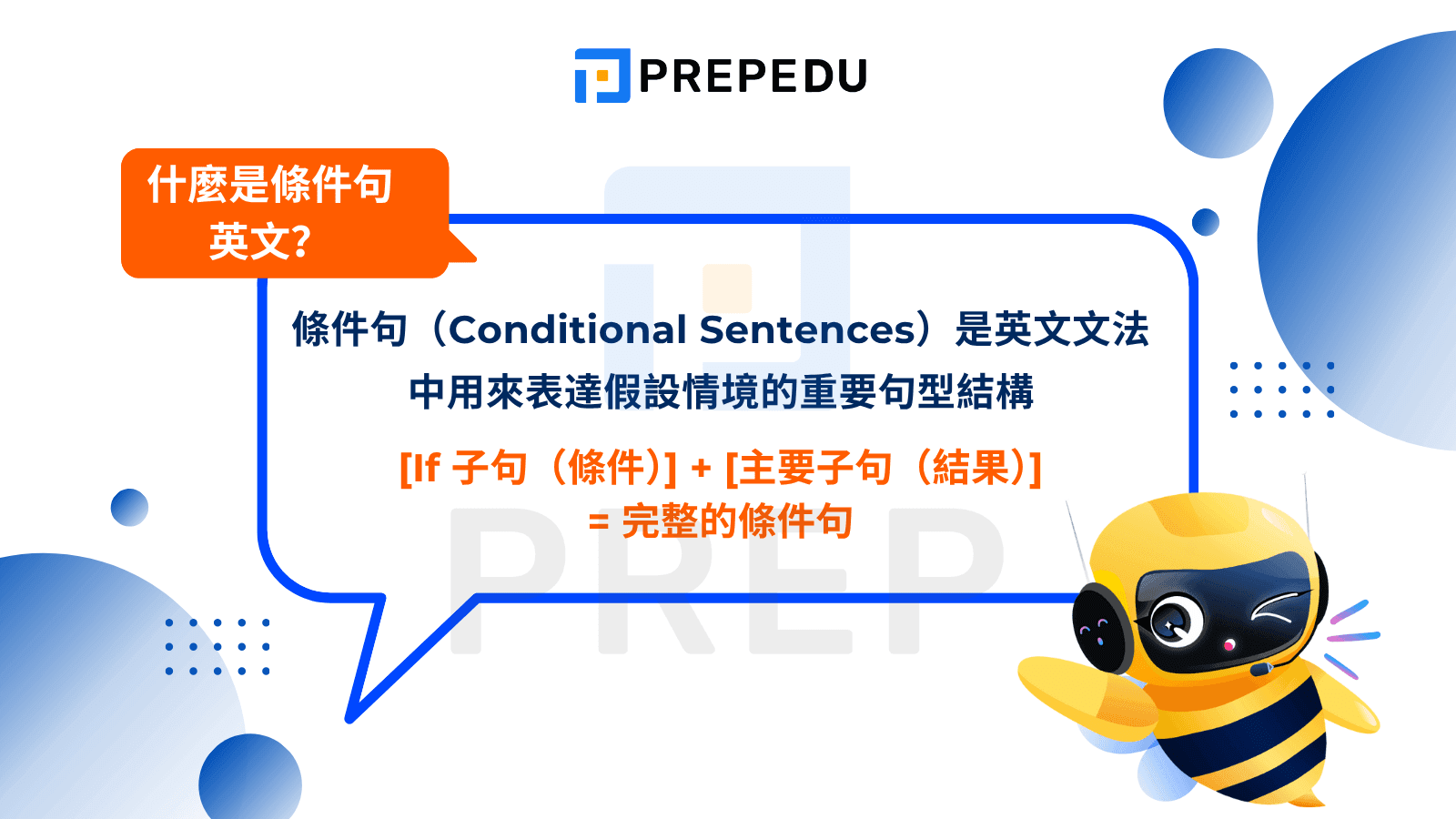
II. 英文條件句的五大核心類型:從零到混合,逐一擊破
條件句有哪些?英文條件句根據時間框架和真實性程度,可以系統性地分為五種主要類型。每種類型都有其特定的文法結構和使用情境。接下來,你將學習從最基本的零條件句到最複雜的混合條件句,全面掌握條件句的完整體系。
英文條件句五大類型總覽表:
|
英文條件句 |
Conditional sentences 用法 |
時態結構(If 子句/主要子句) |
真實性 |
|
零條件句(Zero Conditional - Type 0) |
科學事實,普遍真理,習慣 |
現在簡單式/現在簡單式 |
100% 必然發生 |
|
第一類條件句(First Conditional - Type 1) |
未來真實可能的情況 |
現在簡單式/will + 原形動詞 |
真實且可能 |
|
第二類條件句(Second Conditional - Type 2) |
與現在/未來相反的假設 |
過去簡單式/would + 原形動詞 |
不太可能或虛構 |
|
第三類條件句(Third Conditional - Type 3) |
與過去相反的假設 |
過去完成式/would have + p.p. |
完全不可能(已成過去) |
|
混合條件句(Mixed Conditional) |
跨時間的假設 |
混合不同時態(如過去完成式/would + 原形動詞) |
複合假設 |
1. 條件句第一型態:零條件句(Zero Conditional)——描述不變的真理與事實
零條件句(Conditional sentence type 0)用於陳述普遍真理,科學事實或習慣性行為。這種英文條件句描述的是必然發生的結果,而非可能性或假設。當條件成立時,結果百分之百會發生。
文法公式:
If + S1(主詞)+ V(s/es)(現在簡單式動詞)+ O, S2(主詞)+ V(s/es)(現在簡單式動詞)+ O
Conditional sentence type 0 用法說明:零條件句的兩個子句都使用現在簡單式,因為描述的是不受時間限制的事實。
使用時機:
|
闡述科學定律與普遍真理 |
零條件句最常用於表達不受時間影響的客觀事實。這些陳述在任何時候都成立,不帶有個人觀點或假設成分。 範例:
|
|
描述個人或事物的固定習慣 |
除了科學真理,零條件句也能描述規律性的行為模式和個人習慣。這些英文條件句反映出穩定,可預測的因果關係。 範例:
|
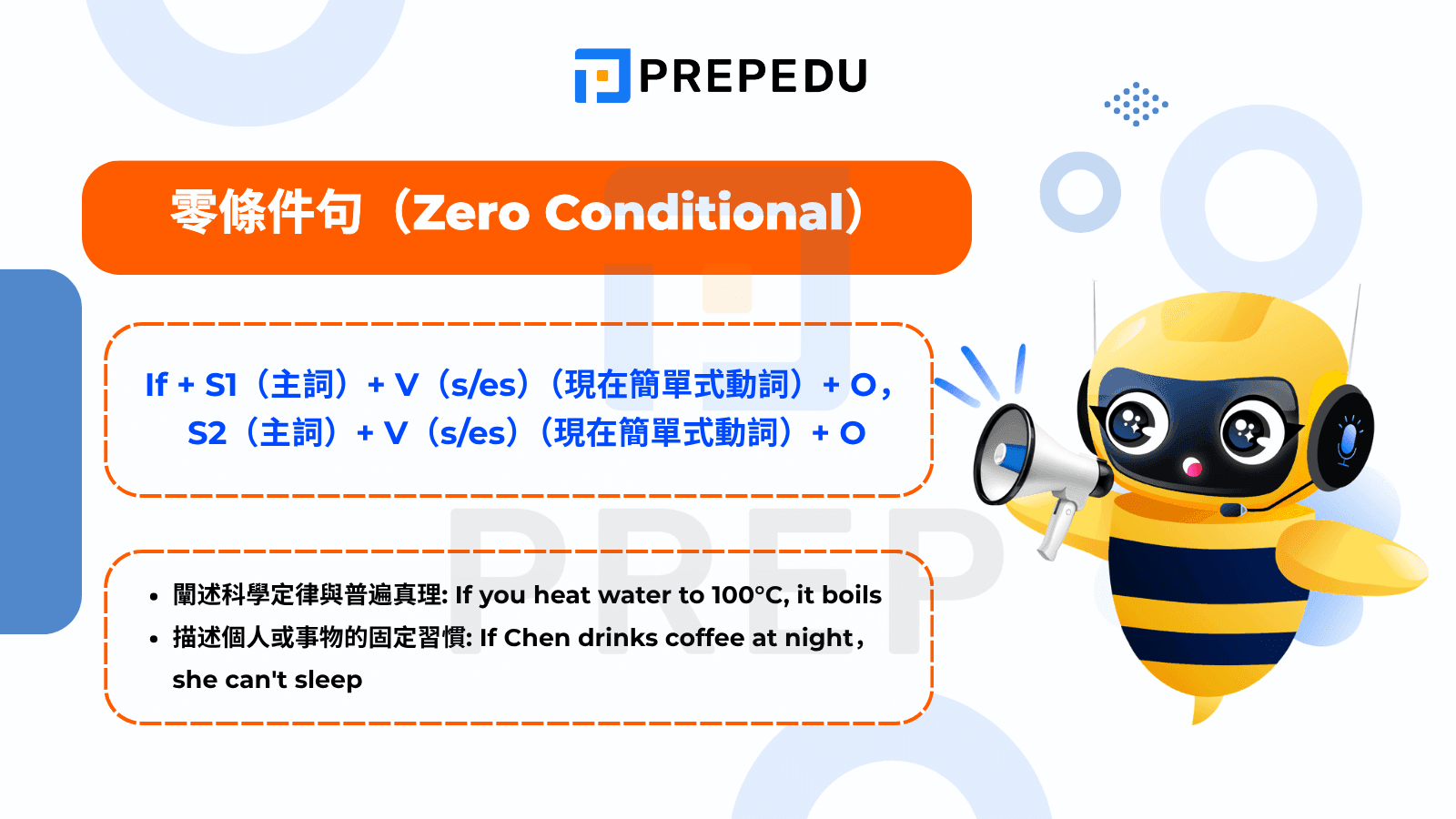
2. 條件句第二型態:第一類條件句 (First Conditional)——預測未來的真實可能
First conditional 是什麼?第一條件句(Conditional type 1)用於談論未來很有可能發生的情況。這種英文條件句表達的是真實的可能性,而非純粹假設。說話者認為條件有合理機會成立,並預測其結果。
文法公式:
If + S1(主詞)+ V(s/es)(現在簡單式動詞)+ O, S2(主詞)+ will/shall/can/may + V(原形動詞)+ O
If 後面用什麼時態?在第一條件句中,If 子句使用現在簡單式,但表達的是未來的情況。主要子句則使用 will + 原形動詞來表達未來的結果。
範例:
-
If Xiaoming studies hard for the IELTS exam,he will get a high score.(如果小明認真準備雅思考試,他會得到高分。)
-
If it rains in Taipei tomorrow,we will stay at the Xinyi shopping district.(如果明天台北下雨,我們會待在信義商圈。)
-
If Linda arrives early at Taoyuan Airport,I'll meet her at Terminal 1.(如果琳達早到桃園機場,我會在第一航廈接她。)
-
If the MRT breaks down during rush hour,thousands of commuters will be late.(如果捷運在尖峰時段故障,成千上萬的通勤族會遲到。)
深入比較:如何分辨 Zero 與 First Conditional 的使用情境?
許多學習者混淆這兩種英文條件句類型,因為它們的 If 子句結構相同。關鍵差異在於結果的確定性和時間框架。
|
類型 |
確定性 |
時間 |
範例 |
|
零條件句 |
必然發生(100%) |
任何時候/永遠 |
If you heat ice, it melts.(如果你加熱冰,它就會融化。——科學事實) |
|
第一類條件句 |
可能發生 (真實可能) |
特定未來時刻 |
If you heat the oven now, the cake will bake in 30 minutes.(如果你現在加熱烤箱,蛋糕30分鐘後會烤好。——未來預測) |
重要提醒:第一條件句的 If 子句雖然使用現在簡單式,但談論的是未來的情況,這就是為什麼我們說"If 條件句用法"中,If 後面不能用 will,要用現在簡單式來表達未來。
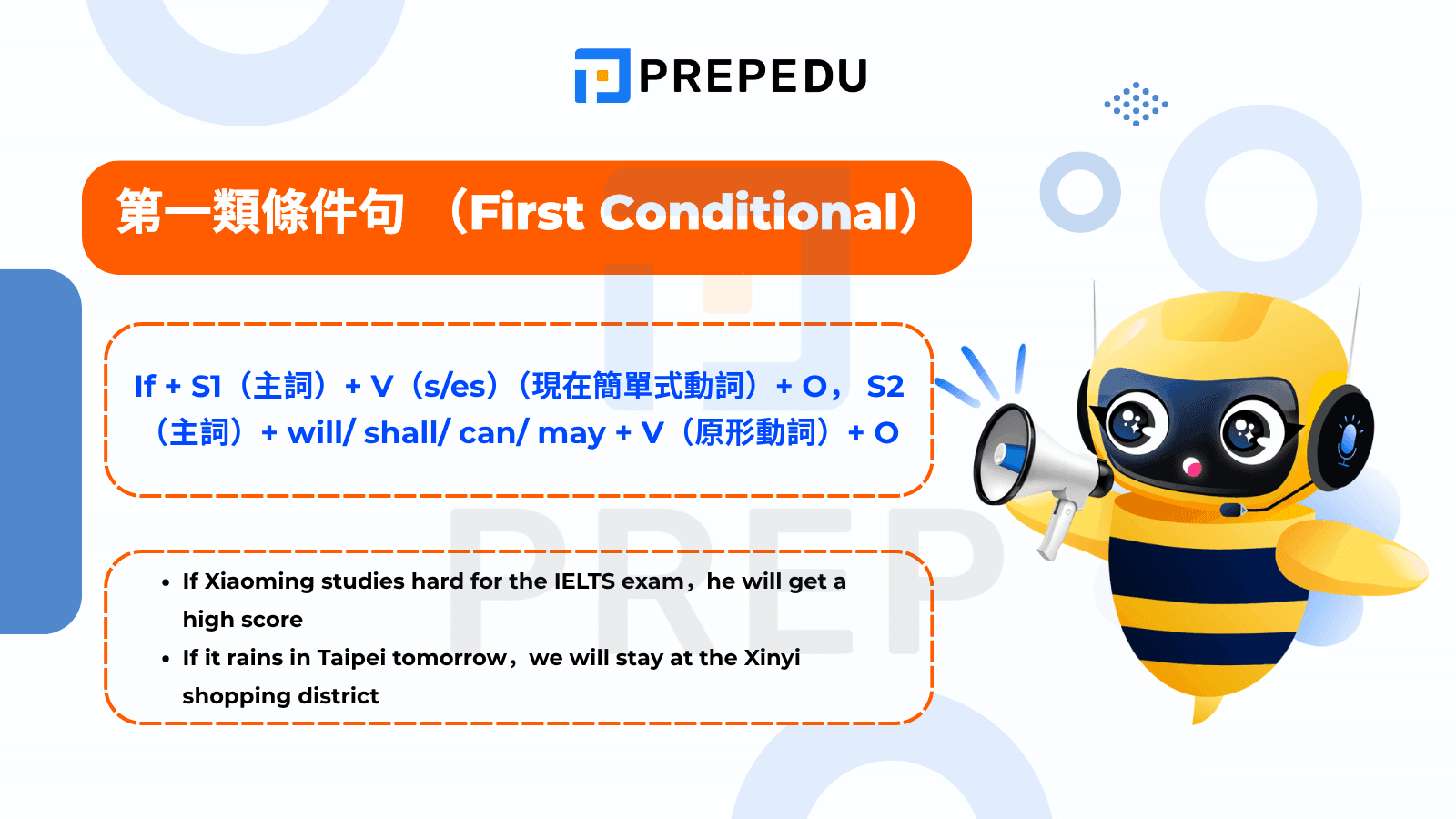
3. 條件句第三型態:第二類條件句(Second Conditional)——與「現在」相反的假設
Second conditional 是什么意思?第二類條件句用於描述與現在或未來事實相反的假設情況。這種英文條件句表達的是不太可能發生或完全虛構的情境,常用於想像,建議或表達願望。
文法公式:
If + S1(主詞)+ V-ed/V2(過去簡單式動詞)+ O, S2 + would/could/might/should + V(原形動詞)+ O
Conditional sentence type 2 用法說明:雖然 If 子句使用過去簡單式,但談論的是現在或未來與事實相反的情況,不是真正的過去。
範例:
-
If I were you,I would accept the job offer from that company in Hsinchu Science Park.(如果我是你,我會接受新竹科學園區那家公司的工作機會。)
-
If we won the lottery jackpot of NT$100 million,we could buy a luxury apartment in Taipei 101 area.(如果我們中了一億元台幣樂透頭獎,我們可以在台北101地區買豪華公寓。)
-
If my sister lived in Hong Kong instead of Kaohsiung,she would experience a completely different lifestyle.(如果我妹妹住在香港而不是高雄,她會體驗完全不同的生活方式。)
為什麼在假設語氣中,be 動詞推薦使用 "were"?在第二條件句中,無論主詞是什麼,傳統文法建議所有人稱的 be 動詞都使用 "were"。這是假設語氣(Subjunctive Mood)的殘留用法。雖然現代口語英文中 "If I was" 也被廣泛接受,但在正式寫作和考試中,"If I were" 仍是更標準,更安全的選擇。這個規則適用於所有使用英文條件句的正式場合。
對比範例:
-
口語: If Daming was rich,he would help more people.(如果大明很有錢,他會幫助更多人。——較不正式)
-
正式: If Daming were rich,he would help more people.(如果大明很有錢,他會幫助更多人。——標準用法)
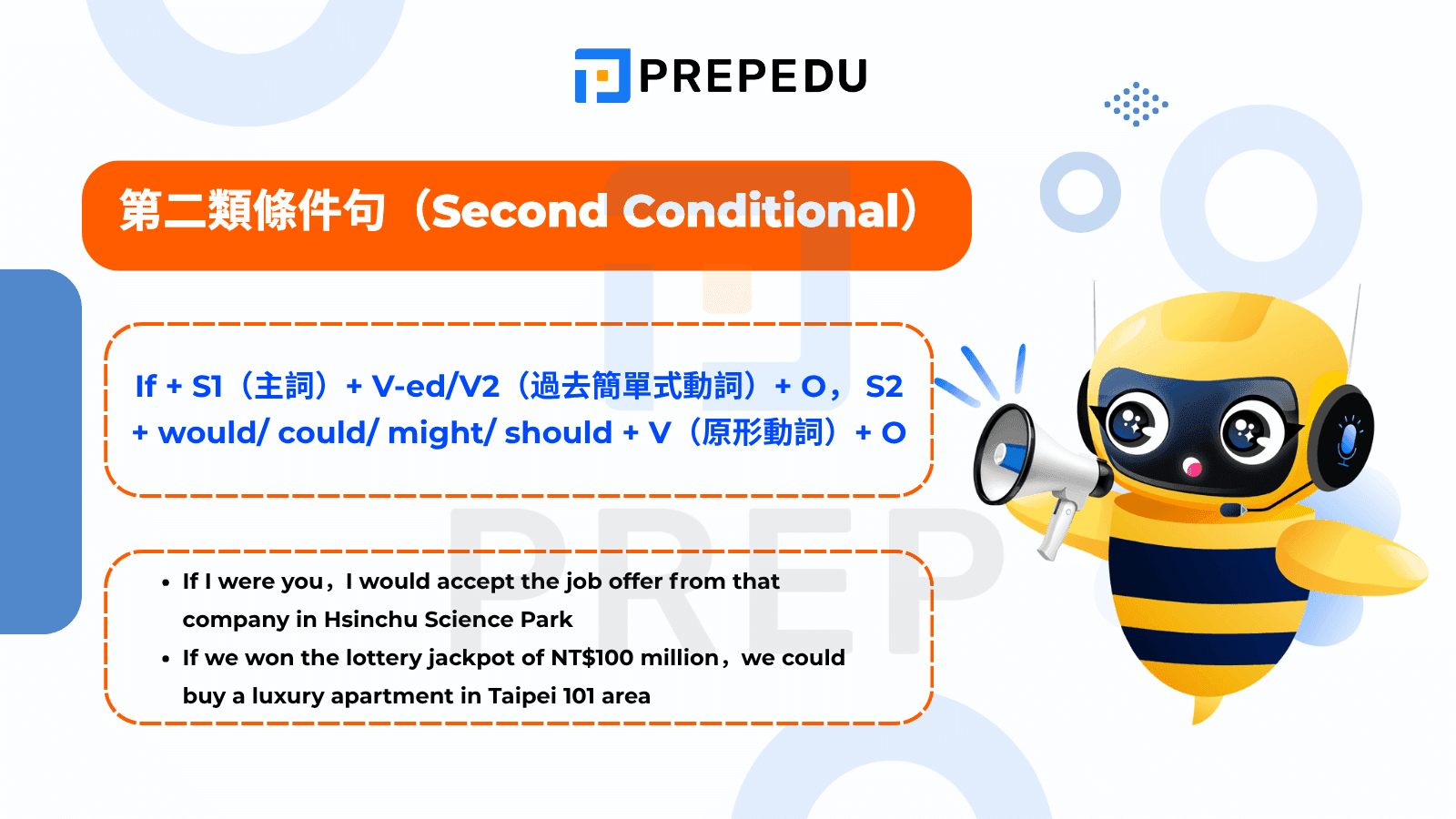
4. 條件句第四型態:第三類條件句(Third Conditional)——對「過去」的懊悔與檢討
Third conditional 是什么?第三條件句用於談論與過去事實完全相反的情況。這種英文條件句表達的是無法改變的過去,常用於表達遺憾,後悔或假設性的歷史情境分析。
文法公式:
If + S1 (主詞)+ had + p.p.(過去分詞)+ O, S2 + would/could/might/should + have + p.p.(過去分詞)+ O
Conditional sentence type 3 用法說明:這是表達對過去遺憾最常用的英文條件句結構,兩個子句都使用完成式來強調「已經無法改變的過去」。
範例:
-
If I had studied medicine at National Taiwan University,I would have become a doctor now.(如果我當時在台灣大學讀醫學,我現在就會是醫生了。)
-
If Xiaohua had left her apartment in Zhongshan District earlier,she wouldn't have missed her flight to Tokyo.(如果小華早點離開她中山區的公寓,她就不會錯過飛往東京的班機了。)
-
If we had bought that property in Taichung ten years ago,we might have made a fortune from the real estate boom.(如果我們十年前在台中買了那棟房產,我們可能已經從房地產熱潮中賺了一大筆錢。)
使用情境:
-
表達遺憾: If I had taken that job in Shanghai,my life would be different now.(如果我接受了上海的那份工作,我的人生現在會不一樣。)
-
檢討決策: If the startup company had invested more in marketing,it would have succeeded in the competitive Taipei market.(如果那家新創公司在行銷上投資更多,它本會在競爭激烈的台北市場成功。)
-
歷史假設: If the pandemic had ended sooner in 2020,millions of small businesses would have been saved.(如果2020年疫情更早結束,數百萬家小企業本可以倖存。)
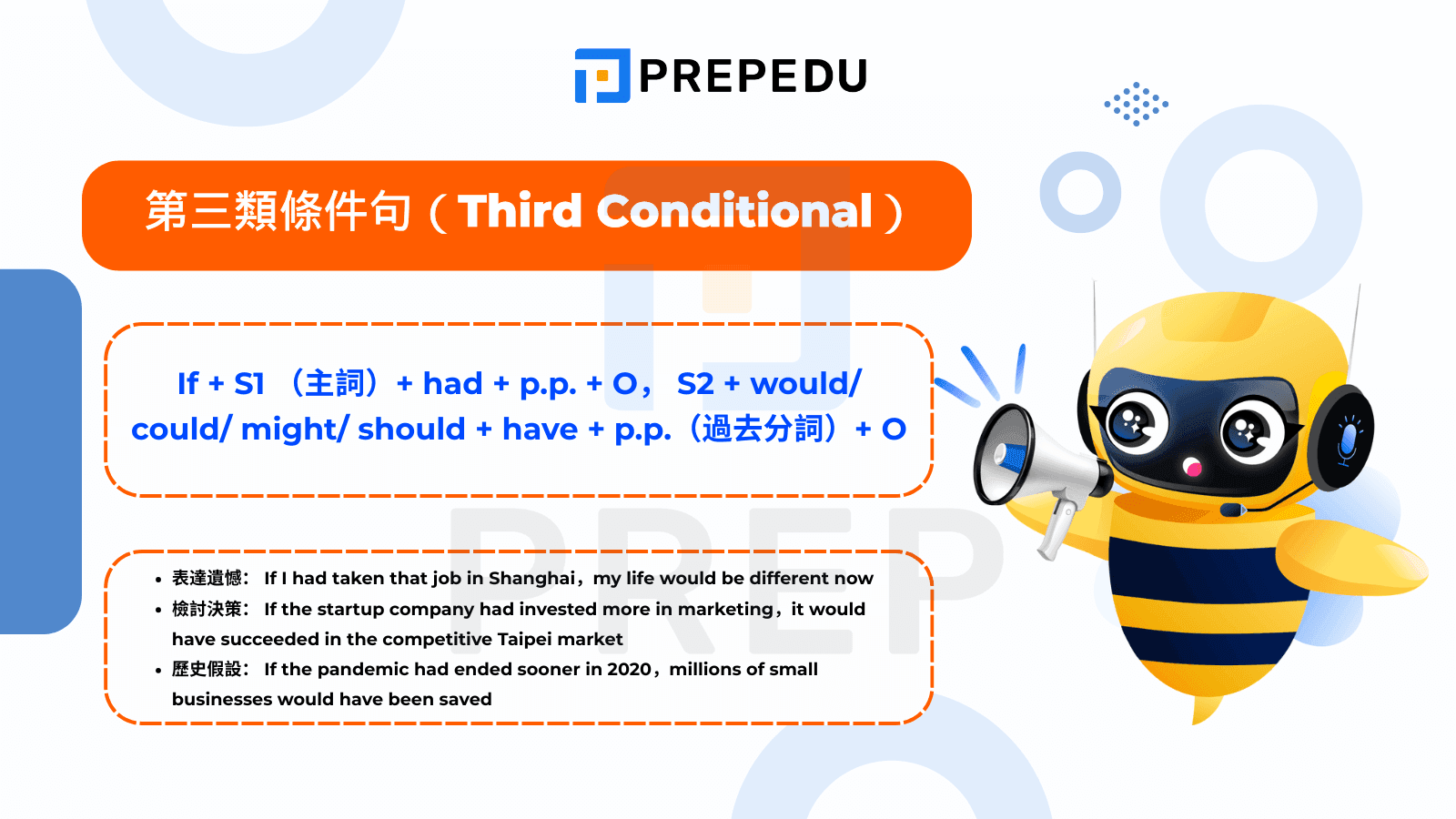
5. 條件句第五型態:混合條件句(Mixed Conditional)——跨越時空的假設情境
混合條件句結合不同時間框架,將過去的條件與現在的結果連結,或將現在的條件與過去的結果連結。這種進階英文條件句讓你能夠表達更複雜的因果關係。
5.1. 類型一:過去的條件影響現在的結果
這是最常見的混合條件句,用於說明過去某個沒有發生的事如何影響現在的狀況。
文法公式:
If + S1(主詞)+ had + p.p.(過去分詞)+ O, S2(主詞)+ would/could/might + V(原形動詞)+ O (now/today)
範例:
-
If Teacher Wang had saved more money during his twenties in Taichung,he could travel around the world freely today.(如果王老師二十幾歲在台中時存了更多錢,他今天就能自由環遊世界了。)
-
If they had moved to Taipei City ten years ago,they would have much better job opportunities now.(如果他們十年前搬到台北市,他們現在會有更好的工作機會。)
-
If my parents had bought that apartment in Xinyi District in 2010,we would be millionaires today.(如果我父母2010年在信義區買了那間公寓,我們今天就是百萬富翁了。)
5.2. 類型二:現在的條件影響過去的結果
這種較少見的混合英文條件句,用於表達現在的狀態如何可能改變過去的結果。
文法公式:
If + S1(主詞)+ V-ed/V2(過去簡單式)+ O (now), S2(主詞)+ would/could/might + have + p.p.(過去分詞)+ O
範例:
-
If he were more careful by nature,he wouldn't have made that critical mistake in yesterday's presentation at the Nangang office.(如果他天生更謹慎,他就不會在昨天南港辦公室的簡報中犯那個重大錯誤了。)
-
If I knew her current address in Tainan,I would have visited her last week when I was there.(如果我知道她在台南的現址,我上週在那裡時就去拜訪她了。)
-
If Xiaojie were more organized as a person,she wouldn't have forgotten about the important client meeting in Kaohsiung yesterday.(如果小潔這個人更有條理,她昨天就不會忘記高雄的重要客戶會議了。)
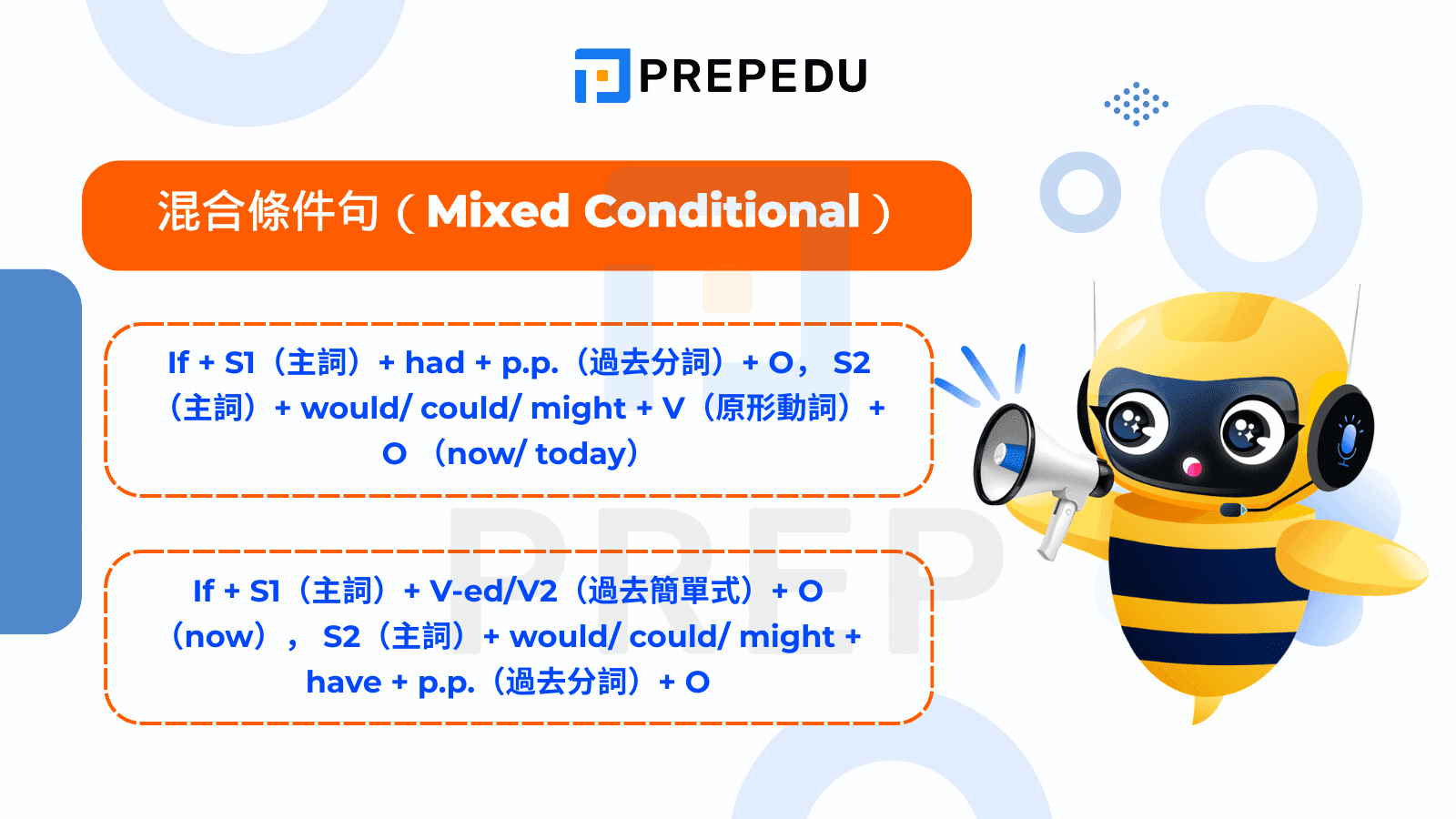
III. 其他英文條件句結構:讓你的表達更豐富
除了使用 "if" 引導條件句,英文還有許多其他方式表達條件關係。掌握這些替代結構能讓你的英文條件句表達更加多元和自然,避免重複使用相同的句型模式。
1. 否定結構:Unless = If...Not 的用法
"Unless" 表示「除非」,等同於 "if...not",但語氣更強,更強調條件的必要性和排他性。這是英文條件句中表達否定條件的重要結構。
對照比較:
|
Unless 句型 |
If...Not 等義句 |
|
Unless you hurry to catch the 7:30 bus, you'll be late for work in Taipei.(除非你趕快搭7:30的公車,否則你上班會遲到。) |
If you don't hurry to catch the 7:30 bus, you'll be late for work in Taipei.(如果你不趕快搭7:30的公車,你會遲到。) |
|
We won't go to Kenting unless the weather forecast improves.(除非天氣預報改善,否則我們不會去墾丁。) |
We won't go to Kenting if the weather forecast doesn't improve.(如果天氣預報沒有改善,我們不會去墾丁。) |
|
Unless Xiaoming passes the TOEIC exam, he can't apply for that position.(除非小明通過多益考試,否則他不能申請那個職位。) |
If Xiaoming doesn't pass the TOEIC exam, he can't apply for that position.(如果小明沒通過多益考試,他不能申請那個職位。) |
使用要點:
-
Unless 本身已含否定意義,後面不可再用否定動詞
-
Unless 的語氣比 if...not 更強烈,更強調「唯一的條件」
-
在正式警告或最後通牒中,unless 是更恰當的選擇
2. 祈願結構:Wish 的用法
"Wish" 用於表達與事實相反的願望或遺憾,其後的子句英文時態需要「退後一格」來表示假設語氣。Wish 是表達願望的特殊英文條件句結構。
Wish 的三種時態結構:
|
類型 |
句型結構 |
範例 |
|
對現在的願望 |
I wish + 過去簡單式 |
I wish I were taller than 180 cm.(我希望我身高超過180公分。——但我現在沒有) |
|
Xiaolin wishes she lived in Taipei instead of a small town.(小林希望她住在台北而不是小鎮。——但她現在住小鎮) |
||
|
對過去的遺憾 |
I wish + 過去完成式 |
I wish I had studied abroad at a university in the UK.(我希望我當時在英國大學留學。——但我當時沒有) |
|
Manager Chen wishes he had invested in that technology company.(陳經理希望他當時投資了那家科技公司。——但他當時沒有) |
||
|
對未來的期望 |
I wish + would + 原形動詞 |
I wish the typhoon would change direction away from Taiwan.(我希望颱風會改變方向遠離台灣。——希望未來發生) |
|
We wish our team would win the championship next month.(我們希望我們隊下個月會贏得冠軍。——希望未來發生) |
3.「只要」的條件結構:As long as / So long as / Providing / Provided
這些片語都表達「只要...就...」的意思,強調只需滿足這個條件,結果就會實現。它們都是引導英文條件句的有效連接詞。
範例:
-
You can borrow my scooter as long as you return it before 6 PM and park it at the Zhongxiao Fuxing MRT station.(只要你在下午6點前歸還並停在忠孝復興捷運站,你可以借我的機車。)
-
So long as you finish your assignment by Friday,you can enjoy the weekend at Ximending.(只要你星期五前完成作業,你就可以在西門町享受週末。)
-
We'll go hiking in Taroko Gorge providing the weather forecast shows no rain. (只要天氣預報顯示不會下雨,我們就去太魯閣峽谷健行。)
-
You can use the meeting room in our Xinyi office provided that you book it 24 hours in advance.(只要你提前24小時預約,你就可以使用我們信義辦公室的會議室。)
4. 隱含條件:Or / Otherwise 的用法
"Or" 和 "otherwise" 都表示「否則」,常用於祈使句之後,隱含一個警告性的條件。這是英文條件句的簡化表達方式。
範例:
-
Hurry up to Taipei Main Station,or you'll miss the High Speed Rail to Kaohsiung.(快點到台北車站,否則你會錯過往高雄的高鐵。)
= If you don't hurry up to Taipei Main Station,you'll miss the High Speed Rail to Kaohsiung. -
Study hard for your university entrance exam,otherwise you won't get into your dream school like National Taiwan University.(認真準備大學入學考試,否則你進不了像台灣大學這樣的理想學校。)
= If you don't study hard for your university entrance exam,you won't get into your dream school. -
Save your document every 10 minutes,or you might lose all your work if the computer crashes.(每10分鐘儲存一次你的文件,否則如果電腦當機你可能會失去所有工作。)
5. 提出假設:Suppose / Supposing / What if 的用法
這些片語常用於句首,引出一個假設性問題或情境,讓對話或討論得以展開。它們是開啟英文條件句對話的實用工具。
範例:
-
Suppose we miss the last MRT train from Tamsui. What should we do?(假設我們錯過從淡水出發的末班捷運。我們該怎麼辦?)
-
Supposing you won NT$10 million in the lottery,how would you spend it?(假設你贏了一千萬元台幣樂透,你會怎麼花?)
-
What if it rains during Xiaomei's outdoor wedding ceremony in Yangmingshan?(如果小美在陽明山的戶外婚禮時下雨怎麼辦?)
-
Suppose the typhoon hits Taipei directly next week. Should we cancel our business trip?(假設颱風下週直接襲擊台北。我們該取消商務旅行嗎?)
IV. 倒裝句與英文條件句:更正式,更專業的進階用法
在正式寫作和演說中,英文條件句可以省略 "if" 並使用倒裝結構,讓表達更加簡潔有力。這種用法常見於學術寫作,商業文件和文學作品中。
倒裝規則與範例:
|
類型 |
正常語序 |
倒裝語序 |
|
Type 1 倒裝 (should) |
If you should need any assistance at our Taipei office,call extension 2468. |
Should you need any assistance at our Taipei office,call extension 2468.(如果您在我們台北辦公室需要任何協助,請撥分機2468。) |
|
Type 2 倒裝 (were) |
If I were in Director Lin's position,I would approve the budget for the Taichung expansion. |
Were I in Director Lin's position,I would approve the budget for the Taichung expansion.(如果我處於林主任的位置,我會批准台中擴展的預算。) |
|
Type 3 倒裝 (had) |
If Professor Wang had known the research results earlier,she would have published her paper before the conference. |
Had Professor Wang known the research results earlier,she would have published her paper before the conference.(如果王教授更早知道研究結果,她會在研討會前發表論文。) |
倒裝要點:
-
將助動詞(should/were/had)移到句首
-
省略 "if"
-
主詞和動詞順序對調
-
語意不變,但語氣更正式
-
這是進階英文條件句的專業表達方式
實用範例:
-
Should you have any questions about our language courses at PREP,please don't hesitate to contact our Taipei branch.(如有任何關於 PREP 語言課程的疑問,請隨時與我們台北分校聯繫。)
-
Were the economic situation in Taiwan different,we might consider expanding to a second location in Taichung.(如果台灣的經濟情況不同,我們可能會考慮在台中開設第二個據點。)
-
Had we received the shipment notification from Kaohsiung Port earlier,we could have prepared the warehouse space in advance.(如果我們早點收到高雄港的出貨通知,我們本可以提前準備倉庫空間。)
V. 使用英文條件句時的注意事項
學習英文條件句時,中文母語者容易犯一些特定錯誤。了解這些常見陷阱能幫助你更精準地使用條件句。常見錯誤與正確用法:
|
錯誤類型 |
錯誤範例 |
正確範例 |
說明 |
|
在 If 子句中誤用 will |
❌ If it will rain in Taipei tomorrow,we will cancel the outdoor concert at Daan Park. |
✅ If it rains in Taipei tomorrow,we will cancel the outdoor concert at Daan Park.(如果明天台北下雨,我們會取消大安公園的戶外音樂會。) |
If 子句表示條件,應使用現在簡單式,不用 will。是學習 If 條件句最重要的規則。 |
|
時態不一致或混淆 |
❌ If I have more money now,I would buy a Tesla Model 3. |
✅ If I had more money now,I would buy a Tesla Model 3.(如果我現在有更多錢,我會買一輛特斯拉 Model 3。) |
第二條件句的 If 子句必須使用過去簡單式來表達與現在相反的假設。 |
|
Unless 後使用否定動詞 |
❌ Unless Xiaozhang doesn't study harder,he will fail the National Exam. |
✅ Unless Xiaozhang studies harder,he will fail the National Exam.(除非小張更認真讀書,否則他會考不過國家考試。) |
Unless 已含否定意義(= if not),不需再加 not。 |
|
混合類型的時態錯配 |
❌ If I studied medicine at National Taiwan University,I would be a doctor yesterday. |
✅ If I had studied medicine at National Taiwan University,I would be a doctor now.(如果我在台灣大學讀醫學,我現在就會是醫生了。) |
過去的條件(had studied)對應現在的結果(would be now),為混合條件句正確用法。 |
|
零條件句和第一條件句混淆 |
❌ If water will reach 100°C,it boils. ❌ If the temperature will reach 35°C tomorrow,we will turn on the air conditioning. |
✅ If water reaches 100°C,it boils.(如果水達到100°C,它就會沸騰。) ✅ If the temperature reaches 35°C tomorrow,we will turn on the air conditioning.(如果明天氣溫達到35°C,我們會開冷氣。) |
科學事實用零條件句,未來預測用第一條件句,但 If 子句都用現在簡單式。 |
VI. 英文條件句練習題(附詳解)
透過實際練習鞏固你對英文條件句的理解。以下提供三組不同難度和類型的條件子句練習,幫助你全面掌握條件句的用法。
1. 練習一:動詞時態填空
請在括號中填入正確的動詞形式:
-
If it __________(rain)in Taipei tomorrow,we will postpone the hiking trip to Elephant Mountain.
-
If I __________(be)you,I would accept the job offer from that startup company in Hsinchu.
-
If Xiaofang __________(study)harder for her final exams last semester,she would have received a scholarship.
-
When water __________ (freeze) at 0°C, it turns into ice.
-
If they __________(arrive)at Taoyuan Airport on time,we can start our road trip to Hualien.
-
If Manager Chen had listened to my business advice,he __________(not make)that costly investment mistake.
-
If we __________(have)more budget this quarter,we would hire three new engineers for our Nangang office.
-
If you __________(heat)cooking oil above its smoking point,it becomes unhealthy.
-
If I had known you were visiting Tainan,I __________(prepare)a tour guide itinerary for you.
-
If Xiaowei __________(not miss)her flight from Hong Kong yesterday,she would be attending the conference in Taipei now.
2. 練習二:情境選擇題
請選擇最適合的英文條件句類型填入空格:
-
"I didn't bring an umbrella to Ximending,so I got completely soaked."
→ If I __________ an umbrella,I __________ soaked.
A)brought / wouldn't get
B)had brought / wouldn't have gotten
C)bring / won't get -
"I don't have NT$50,000 to buy the latest iPhone model."
→ If I __________ NT$50,000,I __________ the latest iPhone.
A)have / will buy
B)had / would buy
C)had had / would have bought -
"You should hurry to catch the MRT,or you'll be late for your interview at the Xinyi District office."
→ If you __________ to catch the MRT,you __________ late for your interview.
A)don't hurry / will be
B)didn't hurry / would be
C)hadn't hurried / would have been -
"It's a scientific fact: plants die without sufficient sunlight and water."
→ If plants __________ sufficient sunlight and water,they __________.
A)won't get / die
B)don't get / die
C)didn't get / would die -
"Maybe a typhoon will hit Taiwan next week. If so,all flights from Taoyuan Airport will be cancelled."
→ If a typhoon __________ Taiwan next week,all flights __________ cancelled.
A)hits / will be
B)hit / would be
C)had hit / would have been -
"I studied computer science at National Chiao Tung University in the past, so I'm a software engineer now."
→ If I __________ computer science,I __________ a software engineer now.
A)didn't study / wouldn't be
B)hadn't studied / wouldn't be
C)don't study / won't be -
"Teacher Lin always feels exhausted when she doesn't get at least 7 hours of sleep."
→ If Teacher Lin __________ at least 7 hours,she __________ exhausted.
A)doesn't get / feels
B)didn't get / would feel
C)hadn't gotten / would have felt -
"I'm not the CEO of this company,so I can't approve your promotion request immediately."
→ If I __________ the CEO,I __________ your promotion request immediately.
A)am / will approve
B)were / would approve
C)had been / would have approved -
"We might visit Sun Moon Lake this weekend if the weather forecast shows clear skies."
→ If the weather forecast __________ clear skies,we __________ to Sun Moon Lake.
A)shows / will go
B)showed / would go
C)had shown / would have gone -
"Xiaojun didn't save money when he worked in Shanghai,so he's struggling financially in Taipei now."
→ If Xiaojun __________ money when he worked in Shanghai,he __________ financially now.
A)saved / wouldn't struggle
B)had saved / wouldn't be struggling
C)saves / won't struggle
3. 練習三:倒裝句改寫
請將以下英文條件句改寫為倒裝句:
-
If you should have any problems with our online learning platform at PREP,contact our technical support team immediately.
-
If I were as wealthy as those entrepreneurs in Taipei 101,I would donate generously to charitable organizations.
-
If Director Wang had known about the urgent client meeting,he would have returned from his business trip to Kaohsiung earlier.
-
If they should arrive at our Taichung branch before 10 AM,please ask them to wait in the VIP lounge.
-
If we were to win first place in the startup competition,we would use the prize money to expand our operations.
-
If you had told me about the deadline extension earlier,I could have submitted a more comprehensive proposal.
-
If she were the project manager for this campaign,she would implement a completely different marketing strategy.
-
If the company had invested in AI technology five years ago,it would have dominated the market by now.
-
If you should need any assistance during your visit to our Xinyi headquarters,feel free to ask our reception staff.
-
If I had been properly informed about the visa requirements,I would have prepared all necessary documents for my trip to Hong Kong.
4. 解答與分析
練習一解答:
-
rains(第一條件句 - 未來真實可能)
-
were(第二條件句 - 假設語氣用 were,不論主詞)
-
had studied (第三條件句 - 過去事實相反)
-
freezes(零條件句 - 科學事實,兩個子句都用現在簡單式)
-
arrive(第一條件句 - If 子句用現在簡單式表未來)
-
wouldn't have made (第三條件句 - 過去假設的結果)
-
had(第二條件句 - 與現在相反的假設)
-
heat(零條件句 - 普遍真理)
-
would have prepared(第三條件句 - 過去的假設結果)
-
hadn't missed(混合條件句 - 過去條件影響現在結果)
練習二解答:
-
B(第三條件句 - 過去事實相反:沒帶傘→被淋濕)
-
B(第二條件句 - 現在事實相反:沒錢→買不起)
-
A(第一條件句 - 未來真實預測)
-
B(零條件句 - 科學真理/普遍事實)
-
A(第一條件句 - 對未來的真實預測)
-
B(混合條件句 - 過去的學習決定影響現在的職業)
-
A(零條件句 - 描述習慣性結果)
-
B(第二條件句 - 與現在事實相反的假設)
-
A(第一條件句 - 未來可能發生的計畫)
-
B(混合條件句 - 過去沒存錢影響現在的財務狀況)
練習三解答:
-
Should you have any problems with our online learning platform at PREP,contact our technical support team immediately.
-
Were I as wealthy as those entrepreneurs in Taipei 101,I would donate generously to charitable organizations.
-
Had Director Wang known about the urgent client meeting,he would have returned from his business trip to Kaohsiung earlier.
-
Should they arrive at our Taichung branch before 10 AM,please ask them to wait in the VIP lounge.
-
Were we to win first place in the startup competition,we would use the prize money to expand our operations.
-
Had you told me about the deadline extension earlier,I could have submitted a more comprehensive proposal.
-
Were she the project manager for this campaign,she would implement a completely different marketing strategy.
-
Had the company invested in AI technology five years ago,it would have dominated the market by now.
-
Should you need any assistance during your visit to our Xinyi headquarters,feel free to ask our reception staff.
-
Had I been properly informed about the visa requirements,I would have prepared all necessary documents for my trip to Hong Kong.
VII. 條件句進階問答:釐清你最容易混淆的核心觀念
掌握基本用法後,讓我們深入探討一些進階問題,幫助你建立更完整的英文條件句知識體系。
1. 條件句的 If 子句中,是否絕對不可以使用 will 或 would?
一般教學中,我們說英文條件句的 If 子句不能用 will,但實際上在某些特殊情境下是可以的。當 will 表達「意願」而非「未來時態」時,可以出現在 If 子句中。
可以使用 will 的情境:
|
表達意願或堅持 |
|
|
禮貌請求 |
|
重點: 這裡的 will 不是表示未來時態,而是表達「意願,堅持或禮貌請求」的情態動詞。在標準的英文條件句時態用法中,If 子句仍然不使用 will 作為單純的未來標記。
2. "Unless" 和 "if...not" 在語氣和用法上有什麼本質上的不同?
雖然 unless 在大多數英文條件句中可以替換為 if...not,但兩者在語氣強度和使用場合上有細微差異。
語氣差異:
-
Unless 語氣更強,強調「唯一的例外條件」,帶有「除此之外別無他法」的意味
-
If...not 語氣相對中性,單純表達否定條件
對照範例:
-
Unless you apologize to Xiaochen sincerely,I won't forgive you for what happened at the Taipei party. (除非你真誠地向小陳道歉,否則我不會原諒你在台北派對上發生的事。——強調道歉是唯一出路)
-
If you don't apologize to Xiaochen,I won't forgive you. (如果你不向小陳道歉,我不會原諒你。——中性陳述)
使用建議: 當你想在英文條件句中強調「這是唯一的條件」或「別無選擇」時,使用 unless 能傳達更強烈的訊息。在正式警告或最後通牒時,unless 是更好的選擇。
4. 除了廣為人知的 if 之外,還有哪些詞彙可以用來引導條件子句?
英文中有許多詞彙和片語能夠引導英文條件句,讓你的表達更加多元。這些替代詞彙根據其語意可以分為幾類:
|
表達「只要」的詞彙 |
|
|
表達「除非」的詞彙 |
|
|
表達「假設」的詞彙 |
|
|
表達「無論」的詞彙 |
|
|
表達「一...就...」的詞彙 |
|
結論
英文條件句是表達假設,可能性和因果關係的強大工具。從描述科學真理的零條件句,到表達遺憾的第三條件句,再到複雜的混合條件句,每種類型都有其獨特的功能和使用情境。透過本指南的系統學習和充分練習,你已經建立了堅實的英文條件句知識基礎。
記住,熟練掌握英文條件句不僅能提升你的文法正確性,更能讓你精準表達複雜的思想和假設情境。從 Conditional sentence type 0 的普遍真理,到 Conditional sentence type 1 2 3 的不同時態和假設程度,每一種英文條件句都是精準溝通的關鍵工具。持續練習條件子句,在實際溝通中靈活運用這些結構,你的英文表達能力將會大幅提升。
對 IELTS 或 TOEIC 考試結構感到陌生?考試當天的不確定感會影響你的表現。PREPEDU 的 Test Practice 提供真實模擬環境,讓你在實戰前熟悉題型和時間限制。
系統收錄超過 1,000 道練習題,定期更新以反映最新考試趨勢。AI 引擎分析你的錯誤,針對弱點提供改進方案。進度追蹤系統將你的成長數據化,讓進步一目了然。

你好!我叫黃秋賢。現在在網站 prepedu.com 的部落格擔任產品內容經理。
我有超過5年的英語、韓語等外語自學經驗,並準備過 IELTS、TOEIC、TOPIK 等考試,累積了豐富的實戰知識,也曾協助數千位在語言學習上遇到困難的人。希望以上的分享能幫助大家在家中更有效率地自學!
評論


